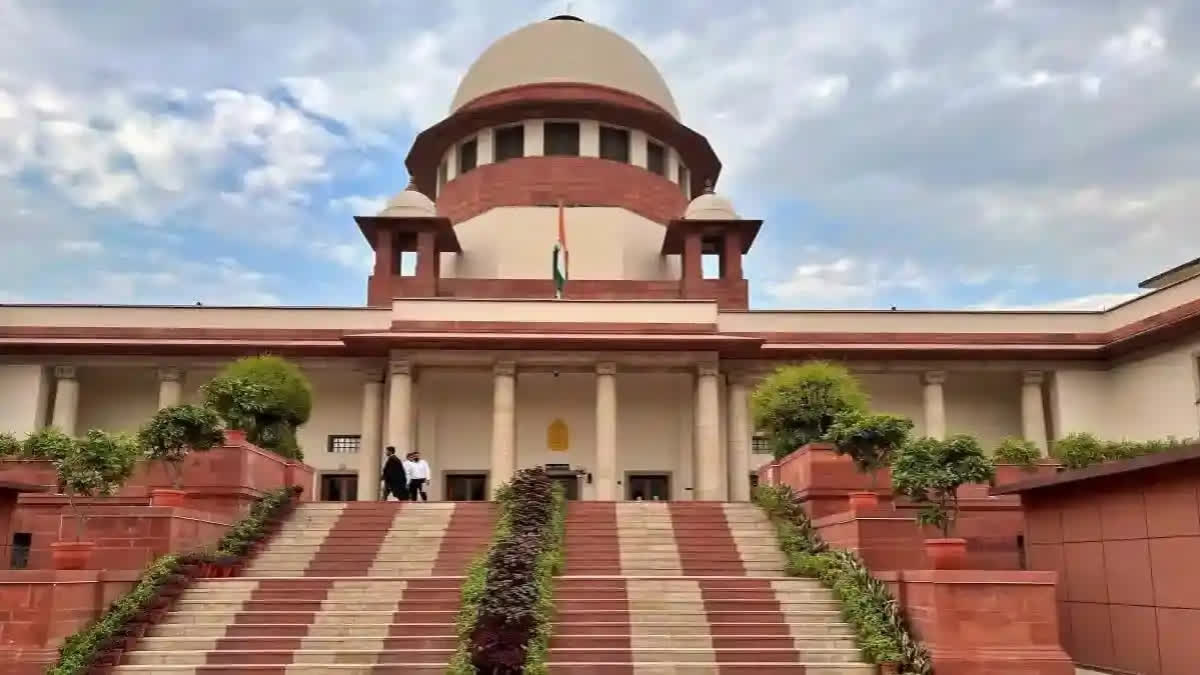New Delhi: All things which are available in the material world and made available by human interaction constitute the resource of the community, Attorney General R Venkataramani, appearing for Maharashtra, told the Supreme Court on Thursday as it continued to hear the case regarding the government's jurisdiction to requisition and redistribute private properties, should they be deemed "material resources of the community" as per Article 39(b) of the Constitution.
The Supreme Court is hearing the matter amid a separate political debate on the issue as political parties slug it out over controversy on remarks over redistribution of wealth. Attorney General Venkataramani told the Court that all things which are available in the material world and made available by human interaction constitute the resource of the community, which includes a car, corporation producing cars, semiconductor chip, and mobile phones, a broad statement relevant for understanding Article 39 (b) and (c).
A nine-judge bench headed by Chief Justice DY Chandrachud and also comprising Justices Hrishikesh Roy, B V Nagarathna, S Dhulia, J B Pardiwala, Manoj Misra, R Bindal, S C Sharma, and A G Masih, is examining a legal question whether the state can exercise control over privately held property or resources under the term “material resources of the community” in Article 39(b) of the Constitution, which is part of the Directive Principles of State Policy (DPSP).
The Attorney General said Article 39 of the Constitution of India and, in particular, Article 39 clauses (b) and (c) are best understood as a combination of social, economic, and political principles. “The organisation of human life involves the organisation of our activities, transactions and our interactions with the physical world, for the purposes of sustenance and welfare. All of the above can happen with the world of resources, available both in natural state and made available by human interaction. Thus, all things in the material world which are available and made available by human interaction or engagement constitute the resources of the community”, said the AG’s note submitted in the apex court.
The AG contended before the bench that the resources, anything object in the material and physical world that human beings can use, exploit for human consumption, or anything in object that can be made or created for human purposes will constitute resources of the community.
“In your definition there is no concept of private ownership at all," queried the CJI. The AG stressed on the distinction between natural vs man-made resources and added that the object of Article 39(b) is the realisation of common good by recourse to the resources of the community.
The CJI asked, “There has to be a material resource of the community?” AG said after all we live in a material world and all resources used or created are material resources. The CJI further queried, “They may not be material resources of the community? Your formulation is anything which is created by application of private labour is a material resource of the community? You said of the community, does all things in the material world and made available human interaction or engagement constitute the resources of the community?”
The AG said that is right. The CJI further queried, “in my house, using my own income, is it a material resource of the community? If I own a car, is it a material resource of the community? What I earn by way of salary?”
The AG said that too can and in a given case what I create for myself for personal consumption, it does not transcend beyond a certain limit or boundary and the moment it goes beyond a boundary then the community will have a call on that resource.
Justice Roy queried AG, “community has a connotation and you are saying whatever human resources are capable of generating that also fall in the ambit of community…the government can tax, somebody earning x amount so much tax, y amount so much tax. Then it becomes a resource for the community?”
The AG said the wealth we create is by our interaction and economic activity, the word resource in Article 39 (b) essentially connotes an economic base.
The CJI queried, “That means a corporation produces cars or a corporation produces a semiconductor chip, and a corporation which produces mobiles, are all these material resources of the community?” The AG said they all are resources of the community in the most fundamental constitutional sense.
“The material resources of a community are a wide concept and must be broadly interpreted to bring within its sweep all resources, natural or physical moveable or immovable, corporeal or incorporeal, tangible or intangible properties etc. Private resources or property are part of material resources of the community. All things that produce wealth for the community are material resources. The word 'distribution' equally must be construed broadly to include not only allotment of resources to public use but also dispensation of largess to the poor to provide access to equal opportunity”, said AG’s note.
The bench said that nobody is doubting the salutary aspect of Article 39. J Nagarathna queried, “isn’t this a caveat against the privatization and liberalisation which is the order of the day today? Where private enterprises are being encouraged and as a result the increase in private wealth would ultimately lead to an increase in the nation's wealth”.
The hearing in the case remained inconclusive and it will resume on Tuesday. On Wednesday, the counsel for parties including the Property Owners Association (POA) of Mumbai made vehement submissions that the private properties cannot be taken over by state authorities under the garb of constitutional schemes of Articles 39 (b) and 31 C of the Constitution.



